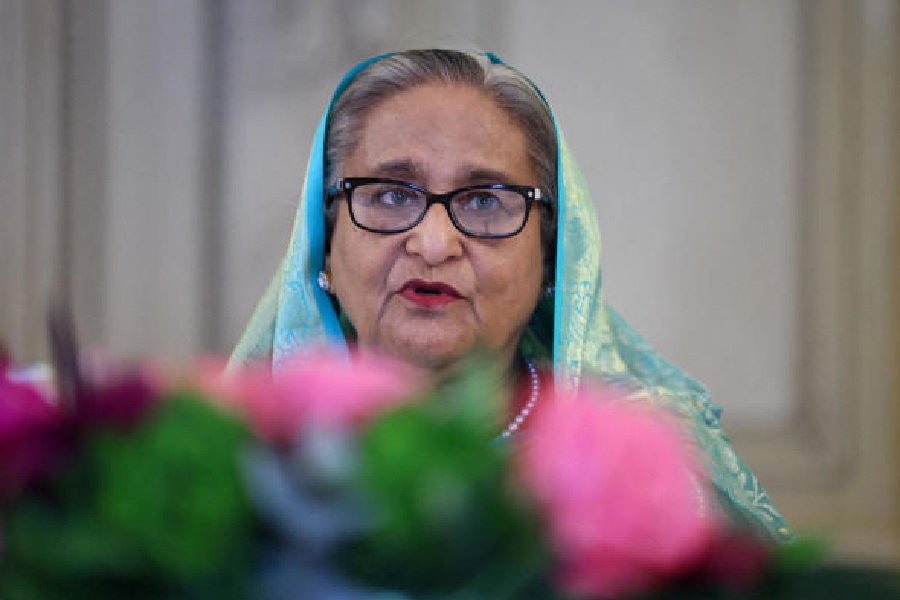DIPLOMATIC DILEMMA: Sheikh Hasina Wazed, the deposed Bangladeshi leader currently sheltering in India, has the Narendra Modi government in a bind. It is loath to give in to the rising political demands in Dhaka to extradite her. It is equally aware of the possible adverse fallout of continuing to play host to her.
Since she fled Bangladesh on August 5 amid a violent street uprising and landed at the Hindon airbase near Delhi, Hasina has remained at an undisclosed and guarded location in India.
Ministry of external affairs (MEA) spokesperson Randhir Jaiswal on Friday fended off questions whether Hasina’s diplomatic passport was being revoked and whether an official demand had come for her deportation.
“What you have asked is in the domain of hypothesis and it is not our practice to answer hypothetical questions,” Jaiswal said.
While a segment of the Bangladeshi media portrayed the MEA’s response as a diversionary tactic and castigated India for sheltering Hasina, conversations with senior politicians in both countries suggested that extradition was indeed a hypothetical question as of now.
Hasina faces over 100 criminal cases encompassing charges from murder to crimes against humanity.
“It’s the responsibility of the interim government, led by Muhammad Yunus, to seek her extradition and they should ask for it,” Mirza Fakhrul Islam Alamgir, secretary-general of the Bangladesh Nationalist Party (BNP), the main political opponent of Hasina’s Awami League, told this correspondent over the phone.
Alamgir, who has been publicly demanding Hasina’s extradition, said he had brought it up during his meetings with Yunus.
“We are not in the interim government but we have placed our demand (for Hasina’s extradition) to him.... She has to be tried in Bangladesh for all her crimes. I don’t know why the interim government has not taken it up with India,” the veteran politician said.
Alamgir’s comments are in sync with the response from the Indian establishment, which says no extradition request for Hasina is pending with it.
Amid speculation whether Hasina would stay on in India or move to another country, Jaiswal said: “As we stated earlier, former Prime Minister of Bangladesh came to India at a very short notice for reasons of safety. We have nothing further to add on the matter.”
An insider to the ruling establishment in New Delhi was more forthcoming on Hasina’s possible extradition and her whereabouts, a subject that many see as one of the lynchpins of the India-Bangladesh relationship in today’s context.
“The BNP is talking about extradition, but they are not the government,” the source said.
“She (Hasina) was certainly not invited to India, but she announced her arrival.... India had to receive her as the person who wanted to come was the Prime Minister of a country.”
A lot has changed in Bangladesh, both in its domestic politics and in its general mood towards the rest of the world, particularly India, in the last three weeks or so.
In the name of ridding the administration and the judiciary of “Awami League corruption”, a new brand of leadership — made up mostly of the young leaders of the student movement and the Islamist parties — has unleashed anarchy marked by the forcible resignations of judges, senior officials and teachers.
While Yunus has pledged to create a fair and just society, the attacks on minorities continue and scores of journalists, civil society members and Awami League leaders have been implicated in a web of cases, stoking fear among ordinary people.
“They (youth leaders and Islamists) have taken control of the media.... A free press and freedom of expression do not exist in Bangladesh any more,” said a seniorjournalist, on the run since being slapped with murder charges.
With several youth leaders who are now national heroes and some established opinion makers spewing venom against India on social media, anti-India sentiments have peaked in the country. It has thrown up the question whether the two countries can have a normal engagement in the near future.
A senior BNP politician agreed that the youth leaders’ excesses had not gone down well with the people, who had lent their support to them a month ago.
“These people do not have the experience or expertise and that’s creating uncertainty.... That’s why we want early elections, so that an elected government, which has accountability, runs the country,” the politician, who did not wish to be named, said.
A source in the Indian establishment said that while New Delhi was keen to “do business” with the new regime in Bangladesh, the situation had been rendered unfavourable by “an entire gamut of uncertainties”.
One instance is India’s decision to abandon full visa services keeping in mind the law-and-order situation across the eastern border.
“We want people-to-people contact with India and we believe that the relationship has to be built on the principles of equality and mutual trust,” Emran Saleh Prince, BNP joint secretary-general, told this correspondent.
“My question is, isn’t India hurting the sentiments of the people of Bangladesh (by sheltering Hasina)?”
Multiple sources on this side of the border said they understood the point, but “throwing her out” was not an option at the moment.
Some experts believe that the best solution for India would be for Hasina to voluntarily move to another country, but such a possibility looks remote in the immediate future.
“No final decision on her travel to the UK has been taken,” a source in New Delhi said.
“The possibility of her going to the UK was raised by the Bangladeshi high commission with the country’s foreign secretary.... Some sort of informal inquiries were also made by the Indian MEA, and these feelers were forwarded to the home office. But no decision had been taken, at least till yesterday.”










